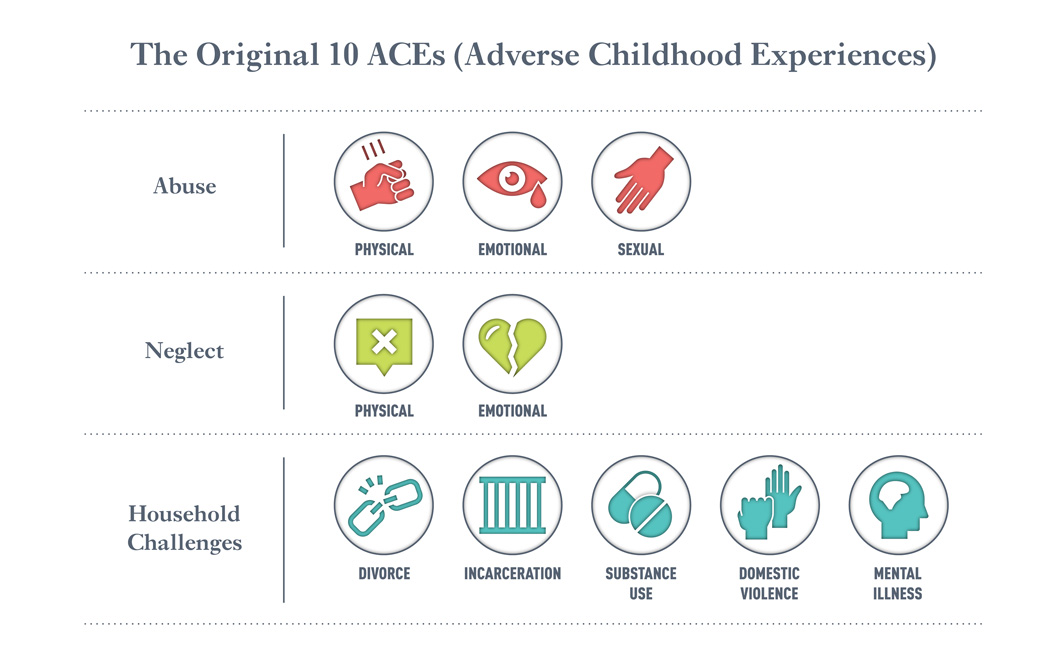Most of us experienced some adversity in our childhoods. Some of us are aware of the ways we may still be impacted. Maybe we’ve worked on some of our own stuff, but parenting is bringing up new issues, or issues from our past. Whatever our journey, understanding our stories – what happened to us, and how we may be impacted today – can help us improve our own well-being and better support our children.
What Are ACEs?
Adverse Childhood Experiences (ACEs) are stressful experiences that can happen to any of us before we turn 18. They’re not our fault, and we don’t have control over when or why they happen. They can be a single event, or an ongoing struggle where our safety, security, trust, or sense of self is threatened or violated.
The original ACEs study included ten types of stressful or traumatic events.

These 10 ACEs are not the only kind of adversities we may face as children. Discrimination, poverty, racism and other common experiences can have similar impacts as ACEs.

Take The ACES Quiz
Learn More About ACES
My Child’s ACE History
Our ACE history counts experiences of abuse, neglect and household challenges that happened to us as children. The higher the number of ACEs, the more likely we are to experience a number of challenges throughout life.
But that number does not define us. It is simply an entry point to our own personal story.
Where it leads is up to you.
The Story of Your Number
Understanding our ACE history can help us heal, disrupt the transmission of ACEs to future generations, and empower us to better support our families and each other. Each of us is a unique story, and we each have the power to determine how our story turns out.
WHY SHOULD I CARE ABOUT MY NUMBER STORY?
As children, when we experience ACEs or other early adversities, they can cause our body’s stress response systems to dysregulate and disrupt our brains, our health, and even our genes.
These disruptions can affect us in childhood and have ripple effects throughout our lives.
When we experience multiple ACEs over time—especially without supportive relationships and safe spaces—the experiences can trigger an excessive and long-lasting stress response. This can have a wear-and-tear effect on the body, like revving a car engine for days or weeks at a time.
ACEs and toxic stress change how we function, not just how we feel. They are especially impactful to the brain from birth to age 3, although toxic stress can impact the brain as it continues to develop into our early 20s. Effects can last, and emerge, throughout our lifetime.
Toxic stress explains how ACEs ”get under the skin” and trigger biological reactions that may lead to challenges in our experiences with education, career, relationships, and our health. Science shows that the higher our ACE score, the greater the odds are that we may experience health issues ranging from asthma, depression, and stroke to cardiovascular disease, PTSD, and cancer. Most of the leading causes of death are associated with ACEs.
This may sound overwhelming or scary. But there’s good news.
The effects of toxic stress are both treatable and preventable.
Many people who have experienced a lot of early adversity have found ways to feel better and live the lives they want for themselves. And science tells us that healing is possible.
ACEs can be passed down from generation to generation
And…
Healing, strength and resilience can also be passed down from generation to generation.
Our ACE history doesn’t represent the whole equation. Positive childhood experiences – like nurturing and supportive relationships, environments, and activities – can protect us and prevent the lasting harms of toxic stress.
What Can We Do To Help Prevent and Reduce The Effects Of ACEs?
For those experiencing lasting effects of ACEs or other early adversities, there are a range of strategies and tools that can help, including mental health care, mindfulness, healthy relationships, movement, spending time in nature, and many others.
There’s a lot we can do to help provide antidotes to the adversity our children face. Nurturing and responsive relationships, safe and stable environments, and supportive social and community activities can help buffer our kids from the effects of toxic stress and steer them toward positive outcomes despite tough times.
Those of us who are able can help advocate for policies and resources that make every neighborhood and every school a safe place for kids to learn and grow. We need to ensure every community and family is equipped to provide all kids with the time, attention, care, and access they need to flourish and thrive.
Download Our Toolkit
For more on ACEs and the positive parenting of children ages 0-5, American SPCC and the ACE Resource Network have collaborated to provide a free, downloadable toolkit:
Understanding our Number Story – considering the lasting effects of our childhoods – can be a catalyst for change. We can break cycles, pave new parenting paths, and connect with people, resources, and communities to support our journeys. We can choose where our stories go from here, and help ensure our children’s stories start with promise and hope.
For Additional Resources and Support
ACEs Healing & Prevention
Positive Parenting
Beyond The Ten ACEs
Building Resilience
Crisis Resources
ACEs Healing & Prevention
Positive Parenting
Beyond The Ten ACEs
Building Resilience
Crisis Resources
American SPCC has teamed up with the ACE Resource Network, the team behind NumberStory.org, to address the most critical health crisis of our time: Adverse Childhood Experiences (ACEs).


